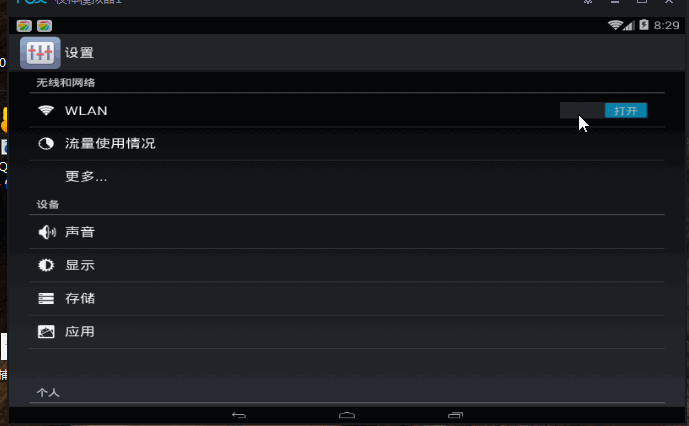Android 四大组件之一:BroadcastReceiver广播机制
一、BroadcastReceiver介绍
BroadcastReceiver是Android的四大组件之一,与Activity和Service具有完整声明周期不同。它本质上是一种全局监听器,用于监听系统全局的广播消息。因此它可以方便地实现系统中不同组件之间的通信。
二、BroadcastReceiver的使用
BroadcastReceiver用于接收程序所发出的 Broadcast Intent事件,它的启动使用步骤:
1、创建class继承BroadcastReceiver。
2、注册广播(静态注册于动态注册)。
2、创建Intent(这里Intent的启动可以是隐式启动也可以是显示启动)。
3、new BroadcastReceiver()对象调用sendBroadcast(intent)方法。
三、简单实例使用:
1、创建MyReceiver 类 继承BroadcastReceiver(重写onReceive方法)
public class MyReceiver extends BroadcastReceiver{
@Override
public void onReceive(Context context, Intent intent) {
// Toast.makeText(context, "我接收到了广播",Toast.LENGTH_LONG ).show();
Log.d("广播", "我接收到了广播");
}
}注意:
1、如果系统找不到Activity的组件可能会报异常,程序终止,但是BroadcastReceiver如果找不到合适的组件应用不会有任何异常。
2、onReceive方法不中不能有耗时操作,如果onReceive方法在10秒内不能执行完成则认为该进程无响应。
2、静态注册与动态注册
♬(1)静态注册(
下面添加在manifest中的注册(包含了一个隐式启动)
<receiver android:name="com.example.mybroadcast.MyReceiver" >
<intent-filter>
<action android:name="hahaha" />
intent-filter>
receiver>♬(2)动态注册(registerReceiver(mreceiver, filter);)
在Activity中进行动态注册广播的时候需要覆写onDestroy方法用于注销。
//代码中注册广播相当于manifest中的注册
mreceiver=new MyReceiver();
IntentFilter filter=new IntentFilter();
filter.addAction("hahaha");
registerReceiver(mreceiver, filter); @Override
protected void onDestroy() {
// TODO Auto-generated method stub
super.onDestroy();
unregisterReceiver(mreceiver);
}4、MainActivity中设置(创建类、创建Intent、发送广播)
@Override
public void onClick(View v) {
switch (v.getId()) {
case R.id.bt_send:
Intent intent=new Intent();
intent.setAction("hahaha");
sendBroadcast(intent);
// Toast.makeText(getApplicationContext(), "发送广播",Toast.LENGTH_LONG ).show();
break;
default:
break;
}
}四、闹钟广播
mAlarmManager = (AlarmManager) getSystemService(ALARM_SERVICE); private void cancelalarm() {
Intent intent = new Intent();
intent.setAction("hahaha");
PendingIntent pending = PendingIntent.getBroadcast(
getApplicationContext(), 0x22, intent,
PendingIntent.FLAG_UPDATE_CURRENT);
mAlarmManager.cancel(pending);
}
private void wakeupalarm() {
Intent intent = new Intent();
intent.setAction("hahaha");
PendingIntent pending = PendingIntent.getBroadcast(
getApplicationContext(), 0x22, intent,
PendingIntent.FLAG_UPDATE_CURRENT);
mAlarmManager.setRepeating(AlarmManager.RTC_WAKEUP,
System.currentTimeMillis() + 5000, 5000, pending);
}五、接收系统广播消息
1、Android 系统广播大全
2、实例:监听app卸载与wifi状态
只需要在manifest中设置权限和获取动态。

添加
<uses-permission android:name="android.permission.CHANGE_NETWORK_STATE"/>
<uses-permission android:name="android.permission.broadcast_packaged_removed"/> <receiver android:name=".MyReceiver">
<intent-filter>
<action android:name="android.intent.action.PACKAGE_CHANGED" />
<action android:name="android.net.wifi.STATE_CHANGE"/>
intent-filter>
receiver>完整
<manifest xmlns:android="http://schemas.android.com/apk/res/android"
package="com.example.mybroadcast"
android:versionCode="1"
android:versionName="1.0" >
<uses-sdk
android:minSdkVersion="8"
android:targetSdkVersion="17" />
<uses-permission android:name="android.permission.CHANGE_NETWORK_STATE"/>
<uses-permission android:name="android.permission.broadcast_packaged_removed"/>
<application
android:allowBackup="true"
android:icon="@drawable/ic_launcher"
android:label="@string/app_name"
android:theme="@style/AppTheme" >
<activity
android:name="com.example.mybroadcast.MainActivity"
android:label="@string/app_name" >
<intent-filter>
<action android:name="android.intent.action.MAIN" />
<category android:name="android.intent.category.LAUNCHER" />
intent-filter>
activity>
<receiver android:name=".MyReceiver">
<intent-filter>
<action android:name="android.intent.action.PACKAGE_CHANGED" />
<action android:name="android.net.wifi.STATE_CHANGE"/>
intent-filter>
receiver>
application>
manifest>